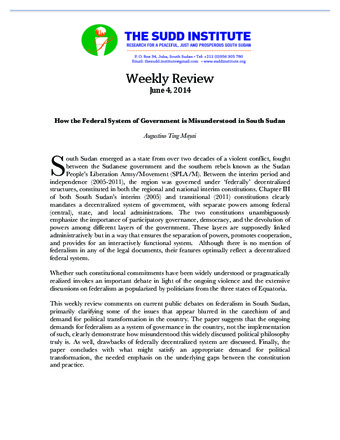How the Federal System of Government is Misunderstood in South Sudan
Publication Summary
South Sudan emerged as a state from over two decades of a violent conflict, fought between the Sudanese government and the southern rebels known as the Sudan People’s Liberation Army/Movement (SPLA/M). Between the interim period and independence (2005-2011), the region was governed under ‘federally’ decentralized structures, constituted in both the regional and national interim constitutions. Chapter III of both South Sudan’s interim (2005) and transitional (2011) constitutions clearly mandates a decentralized system of government, with separate powers among federal (central), state, and local administrations. The two constitutions unambiguously emphasize the importance of participatory governance, democracy, and the devolution of powers among different layers of the government. These layers are supposedly linked administratively but in a way that ensures the separation of powers, promotes cooperation, and provides for an interactively functional system. Although there is no mention of federalism in any of the legal documents, their features optimally reflect a decentralized federal system.
Whether such constitutional commitments have been widely understood or pragmatically realized invokes an important debate in light of the ongoing violence and the extensive discussions on federalism as popularized by politicians from the three states of Equatoria.
This weekly review comments on current public debates on federalism in South Sudan, primarily clarifying some of the issues that appear blurred in the catechism of and demand for political transformation in the country. The paper suggests that the ongoing demands for federalism as a system of governance in the country, not the implementation of such, clearly demonstrate how misunderstood this widely discussed political philosophy truly is. As well, drawbacks of federally decentralized system are discussed. Finally, the paper concludes with what might satisfy an appropriate demand for political transformation, the needed emphasis on the underlying gaps between the constitution and practice.
Augustino Ting Mayai's Biography
Augustino Ting Mayai is the former Managing Director of the Sudd Institute. He is a founding Research Director of the same institution, serving in this capacity for a decade. He holds a Ph.D. in Sociology, with concentrations on demography and development from the University of Wisconsin-Madison. He currently studies how state effectiveness affects child health outcomes in South Sudan and Ethiopia. Dr. Mayai has written extensively on South Sudan’s current affairs. August is the current Chair (Statistician General) of the National Bureau of Statistics, Government of South Sudan.

